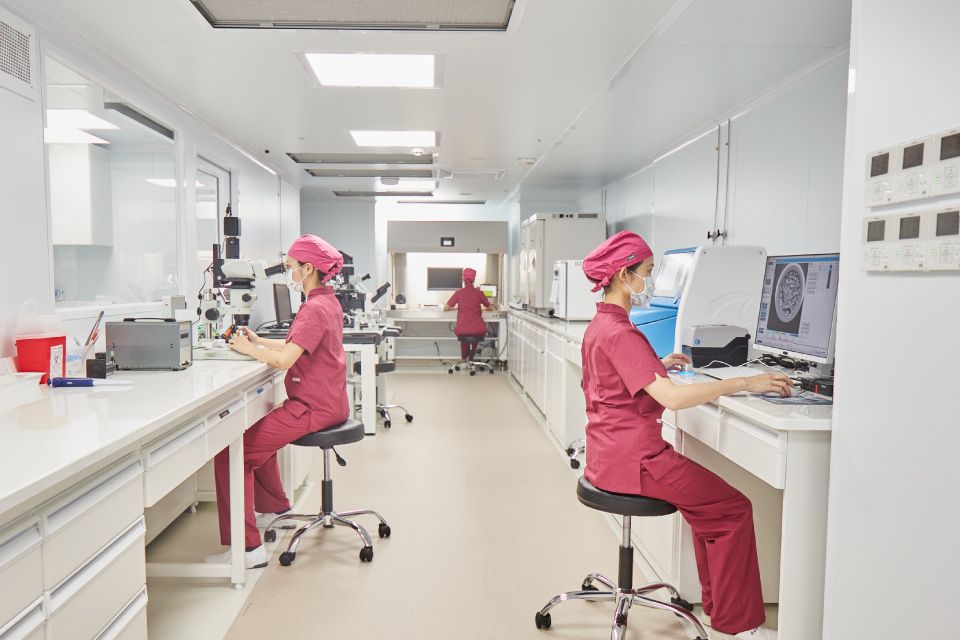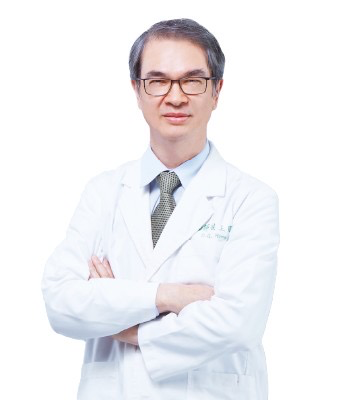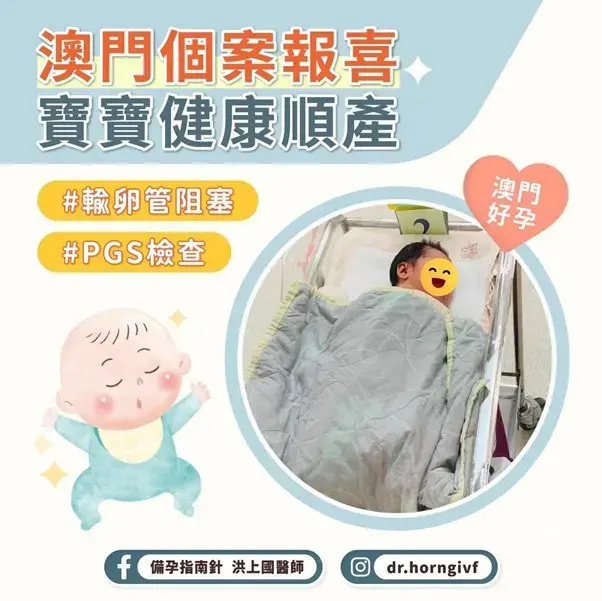NUWA Fertility Center | NUWA TCM CenterNUWA Fertility Center | NUWA TCM Center
NUWA's all-encompassing medical team is centered around female-oriented integrated healthcare, or FEMTECH, and evidence-based medical nutrition treatment implementing both Western and Chinese medicine. We offer cutting-edge reproductive cell storage technology to increase IVF success rates and provide the best services in the greater APAC region. NUWA's team was created with not only the support of world-class medical technology, but also with the team's concept of offering refined psychological care to our patients. Our purpose is to create a personalized plan for you.


NUWA Stories
Resources
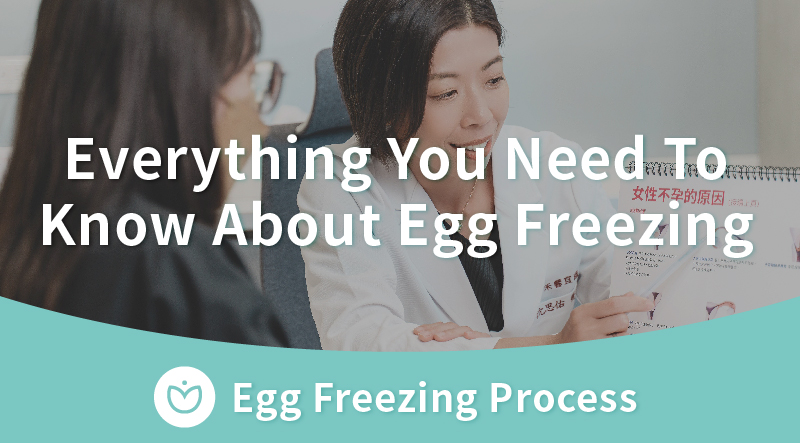
Fertility Resources
Egg Freezing in Taiwan for Foreigners | NUWA Fertility Center
Considering egg freezing abroad? Taiwan has become a top destination for women from Singapore, Malaysia, the Philippines, Thailand, and other Southeast Asian countries seeking safe, affordable, and advanced fertility preservation. NUWA Fertility Center offers comprehensive, foreigner-friendly egg freezing services with world-class care.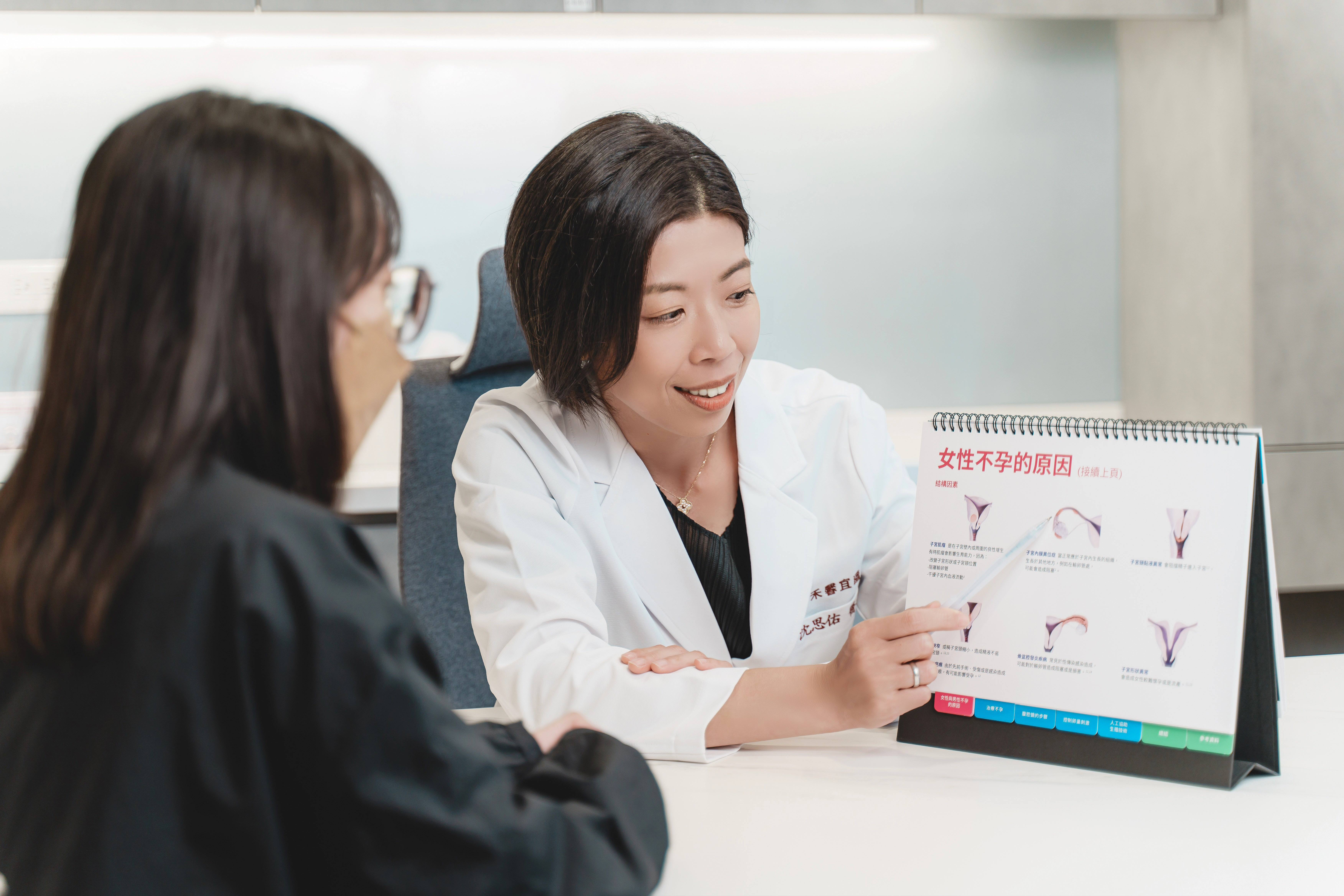
Why Freeze Your Eggs?
Egg freezing (oocyte cryopreservation) empowers women to take control of their reproductive future. Whether you're not ready to start a family or facing medical challenges, fertility preservation allows you to safeguard your chances of having biological children later.🔹 Ideal Age for Egg Freezing:Women between 30 and 35 years old benefit the most, as egg quality and quantity are optimal. After 35, both decline—more rapidly after 38.Generally speaking, if a woman is in good physical condition and has sexual intercourse during her ovulation period, there is a 50% chance of getting pregnant between the ages of 20 and 25, a 40% chance between the ages of 26 and 35, and a 30% chance between the ages of 36 and 40.🔹 Recommended for Women Who:- Cancer patients with future fertility plans
- Over 30 years of age, who will not rule out having children in the future
- Premature ovarian failure or aging, need to collect a sufficient number of eggs for IVF treatment
- Endometriosis patients
- People with a family history of genetic diseases
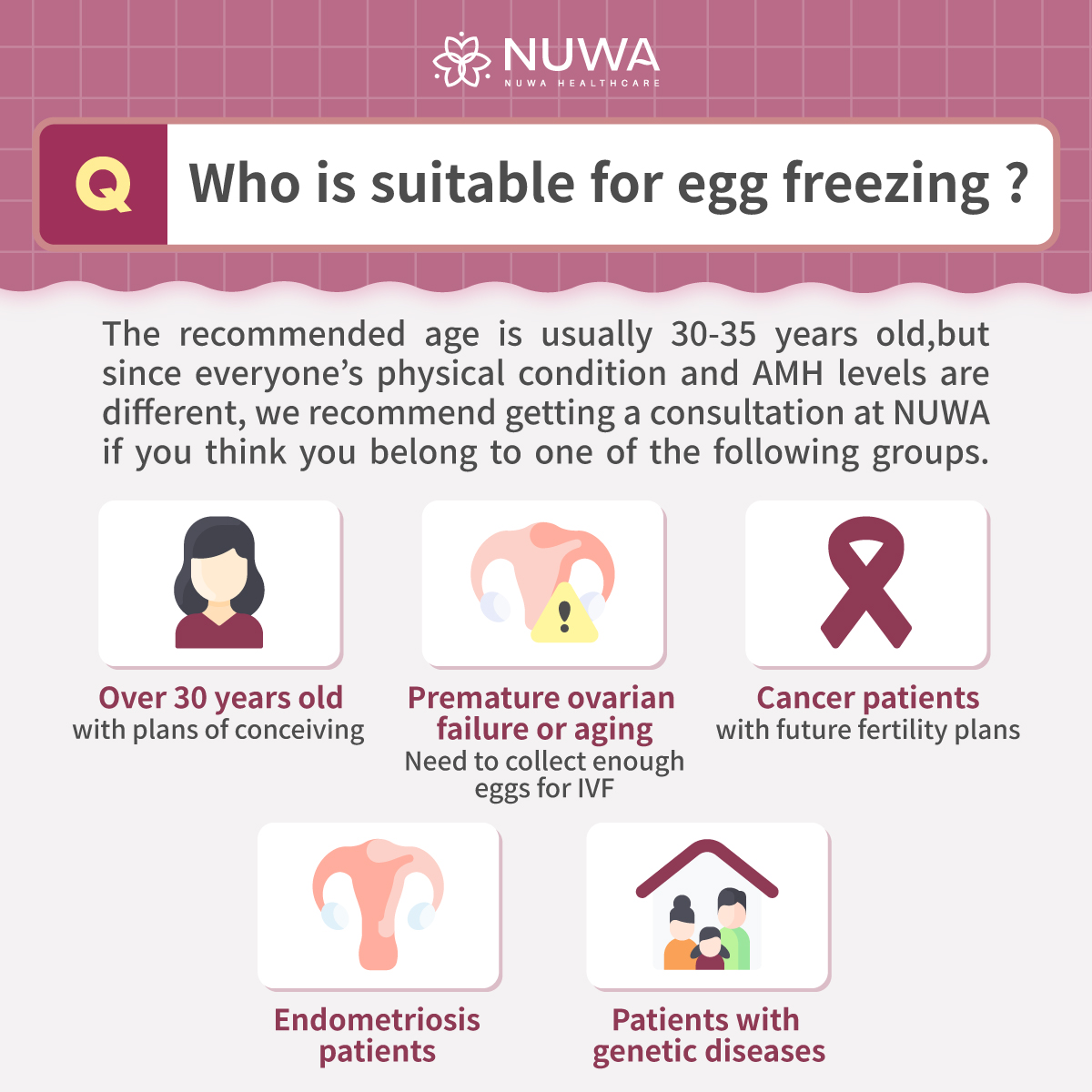 Egg Freezing Procedure at NUWAThe egg freezing process at NUWA typically takes 10–14 days and involves five steps:
Egg Freezing Procedure at NUWAThe egg freezing process at NUWA typically takes 10–14 days and involves five steps: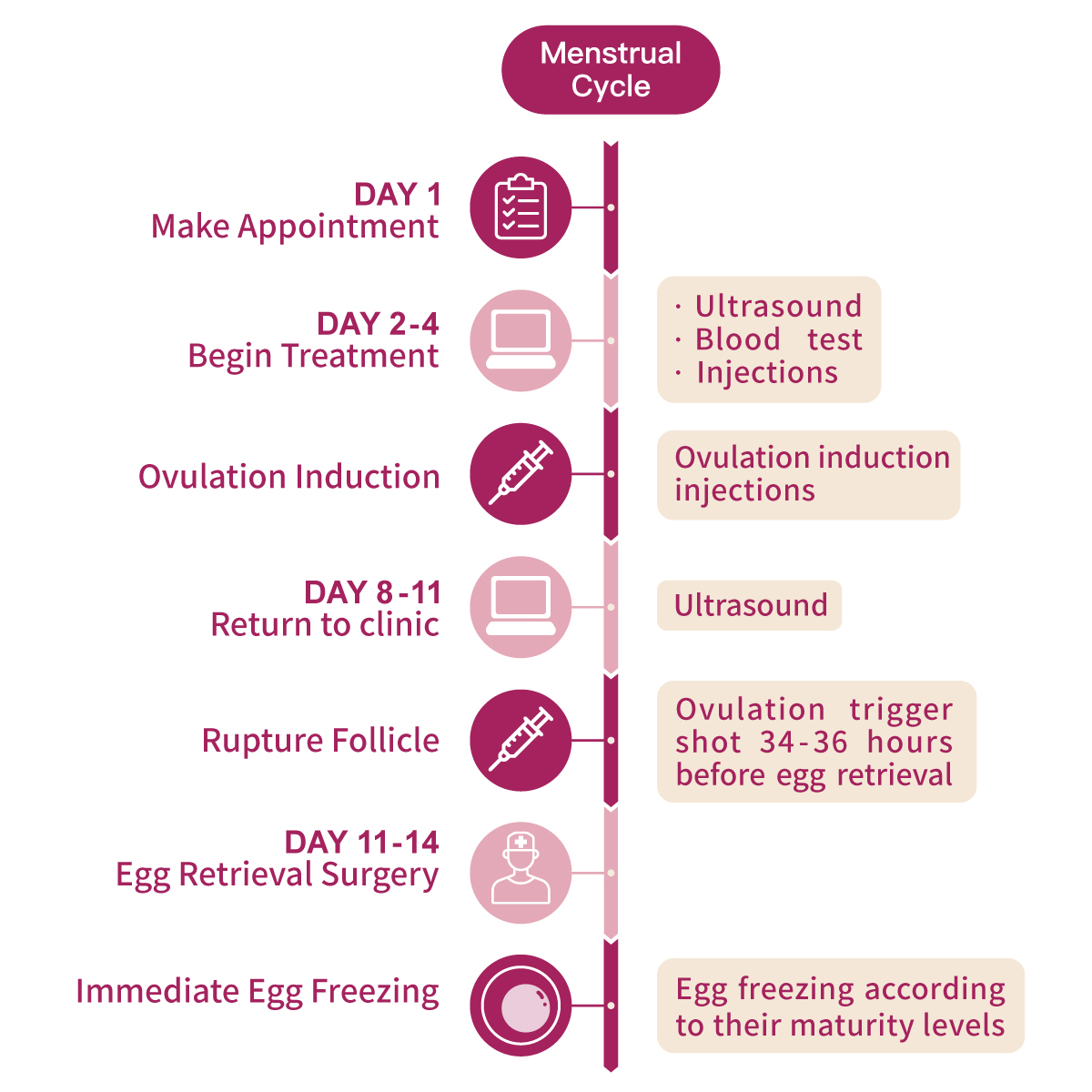
STEP 1: Make an appointment
Make an appointment to see your doctor and inform them about your condition so the doctor can evaluate your condition and assist you in scheduling your treatment.STEP 2:Return to the clinic during the menstrual cycle
Return to the clinic on the 2nd to 3rd day of the menstrual cycle. Blood tests and an ultrasound will be performed before the egg-freezing treatment begins.STEP 3:Ovulation induction
After beginning treatment, according to the doctor's diagnosis, ovulation injections or ovulation medication will be administered to induce ovulation, and about 2 visits will be scheduled for ultrasound examinations.STEP 4:Egg retrieval procedure
Egg retrieval surgery is scheduled around the 11th to 14th day, and an ovulation trigger shot will be given before the procedure (34 to 36 hours before the procedure).STEP 5:Egg freezing
Finally, the eggs will be frozen according to their maturity level. If you freeze your eggs at NUWA Fertility Center, you will be able to find out the number of eggs you have frozen on your NUWA Fertility Center APP.Track your egg count and progress easily via the NUWA Fertility Center mobile app.Egg Freezing Cost in Taiwan
At NUWA, the cost of egg freezing ranges from NT$90,000 to NT$120,000, which includes medication and one year of storage. Costs vary depending on ovarian function, medication, and your personalized treatment plan.💡 Compared to egg freezing prices in Singapore, Malaysia, or Thailand, Taiwan offers excellent value with international-quality standards.FAQs
Q1: How many eggs do you need to freeze to ensure it’s enough?
The quality of eggs decreases with age, and the older you get, the more eggs you would need to freeze if you're planning on expanding your family. According to the experience of our doctors at NUWA Fertility Center, the success rate of pregnancy is 70%:- At 35 years old, you need about 8 eggs.
- At 38 years old, you need about 20 eggs.
- At 40 years old, you need about 35 eggs.
However, we are reminded that the above figures are based on planning for the birth of one child in the future. If you want to have a second or third child, you will need to freeze more eggs.Q2: Will freezing my eggs speed up menopause?
No. Egg freezing doesn’t deplete your natural egg reserve. It simply matures eggs that would have naturally disintegrated in that cycle.Egg freezing treatment is to induce ovulation through drug stimulation, so that other follicles that would have naturally shrunk during the cycles will have a chance to grow and, therefore, will not cause menopause to come early!Q3: Where are my eggs stored?
All eggs are preserved in -196°C liquid nitrogen tanks under 24/7 surveillance with NUWA’s centralized monitoring system, ensuring the highest safety standards.Q4: Are There Consequences that Comes With Egg Freezing?
While mild bloating or nausea may occur, serious complications are rare (<5%). NUWA doctors closely monitor your health throughout the cycle.Q5: Are there government subsidies?
Yes! As of 2025, egg freezing subsidies are available in New Taipei City, Taipei City, Taoyuan, Hsinchu, Taichung, and Hualien for eligible residents. These local government programs aim to support women who wish to preserve their fertility through oocyte cryopreservation (egg freezing).Each city may have slightly different eligibility requirements, subsidy amounts, and application procedures, so we recommend checking with the local Public Health Bureau or contacting NUWA Fertility Center for the most up-to-date details.“2025 Taiwan Egg Freezing Subsidy Program: Eligibility, Application Steps, and Costs”Why Choose NUWA Fertility Center?
🌟 8 Key Advantages:- Taiwan’s Leading Fertility Chain – Clinics in Taipei, Taoyuan, and Taichung.
- International-Standard IVF Labs – Embryologists with 24/7 monitoring systems.
- 96.3% Egg Survival Rate – High post-thaw viability thanks to expert vitrification techniques.
- Privacy & Comfort – Boutique-style clinics designed for relaxation and discretion.
- In-House Injection Support – Personalized guidance for ovulation medication.
- Fast Results – AMH blood test results available in 90 minutes.
- Custom Treatment Plans – Flexible, including long-acting hormone injections.
- Traditional Chinese Medicine Integration – TCM doctors assist with womb and egg health.Traditional Chinese Medicine Integration – TCM doctors assist with womb and egg health.
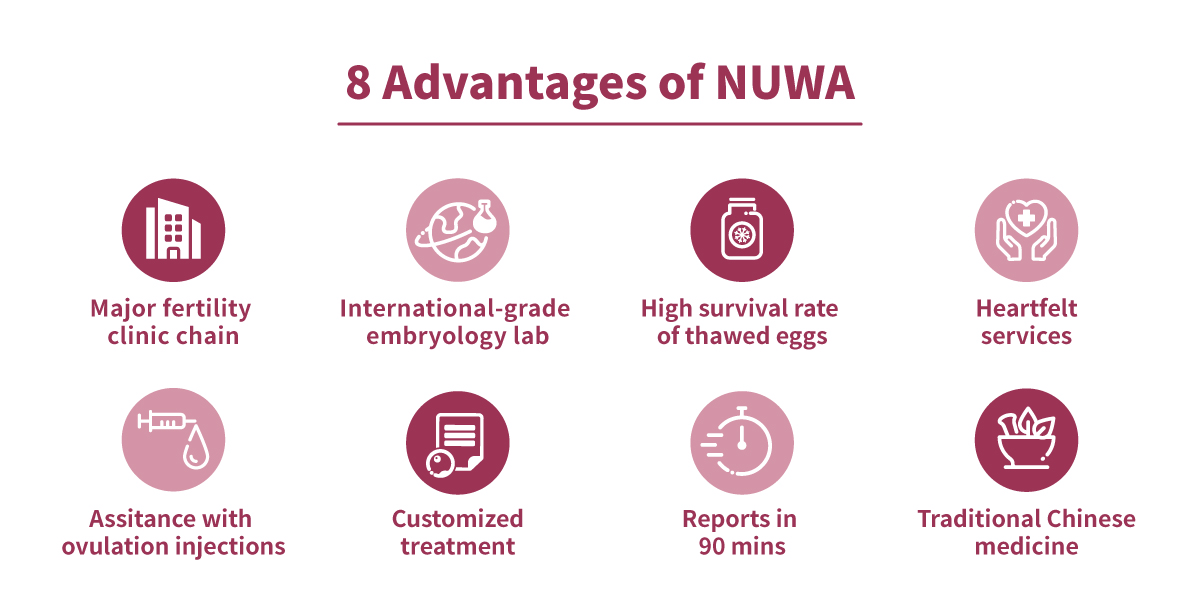
Egg Freezing in Taiwan: The Smart Choice for Southeast Asian Women
Women and couples from Singapore, Malaysia, the Philippines, and Thailand are choosing Taiwan for egg freezing due to:- Lower cost compared to that of their home countries’
- Advanced medical facilities with English-speaking staff
- Seamless coordination between Western and Chinese medicine
- Short travel time and friendly visa policies
Ready to Freeze Your Eggs in Taiwan?
Whether you're still exploring your options or ready to start, NUWA Fertility Center provides professional care, clear communication, and unwavering support.👉 Book a Consultation Online👉 Chat with our International Patient Coordinator👉 Learn More about NUWA’s Fertility ServicesPreserve your fertility before it's too late. NUWA Fertility Center is here to help you plan for the family you may want tomorrow—starting today.Author's InformationNUWA Fertility CenterWith many infertility experts and more than 10,000 doctors with successful IVF experience, the company has 5 clinics, including 3 high-specification IVF reproduction centers, 2 TCM centers, and 3 international embryo laboratories, which are located in Taipei, Taoyuan, and Taichung.Main Services: Infertility treatment, IVF, artificial insemination, egg freezing, egg borrowing, and pregnancy preparation. In 2021, NUWA Healthcare will formally cooperate with Dianthus Medical Group to provide one-stop integrated services from preparation, pregnancy, labor, and postpartum care, which will bring the greatest convenience to the patients.👉Learn more about NUWA Healthcare2025.04.28
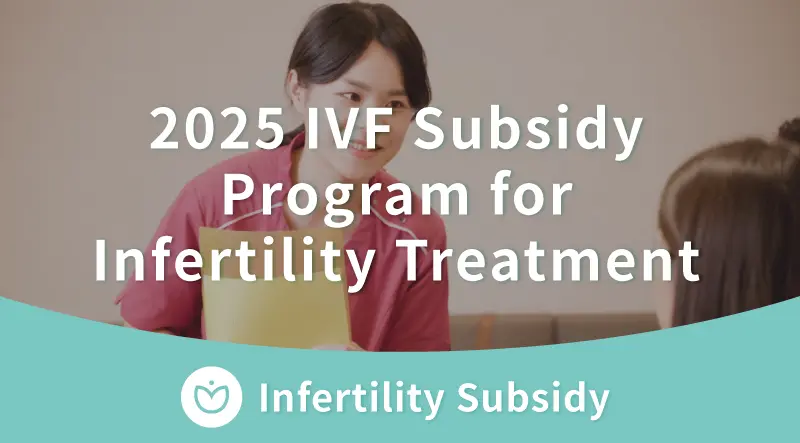
Fertility Resources
2025 IVF Subsidy Program for Infertility Treatment
Planning for pregnancy is a beautiful, wonderful experience that many look forward to. However, your world comes crashing down if you’ve been diagnosed with infertility, especially if you have no idea what to do next. Don’t worry, as birth rates go down, the government has been pushing an “IVF Subsidy Program” directed at infertility treatments to cover partial costs. This is in hopes that couples who have been diagnosed with infertility can happily proceed to the next stage of their lives. Let NUWA explain how the program works!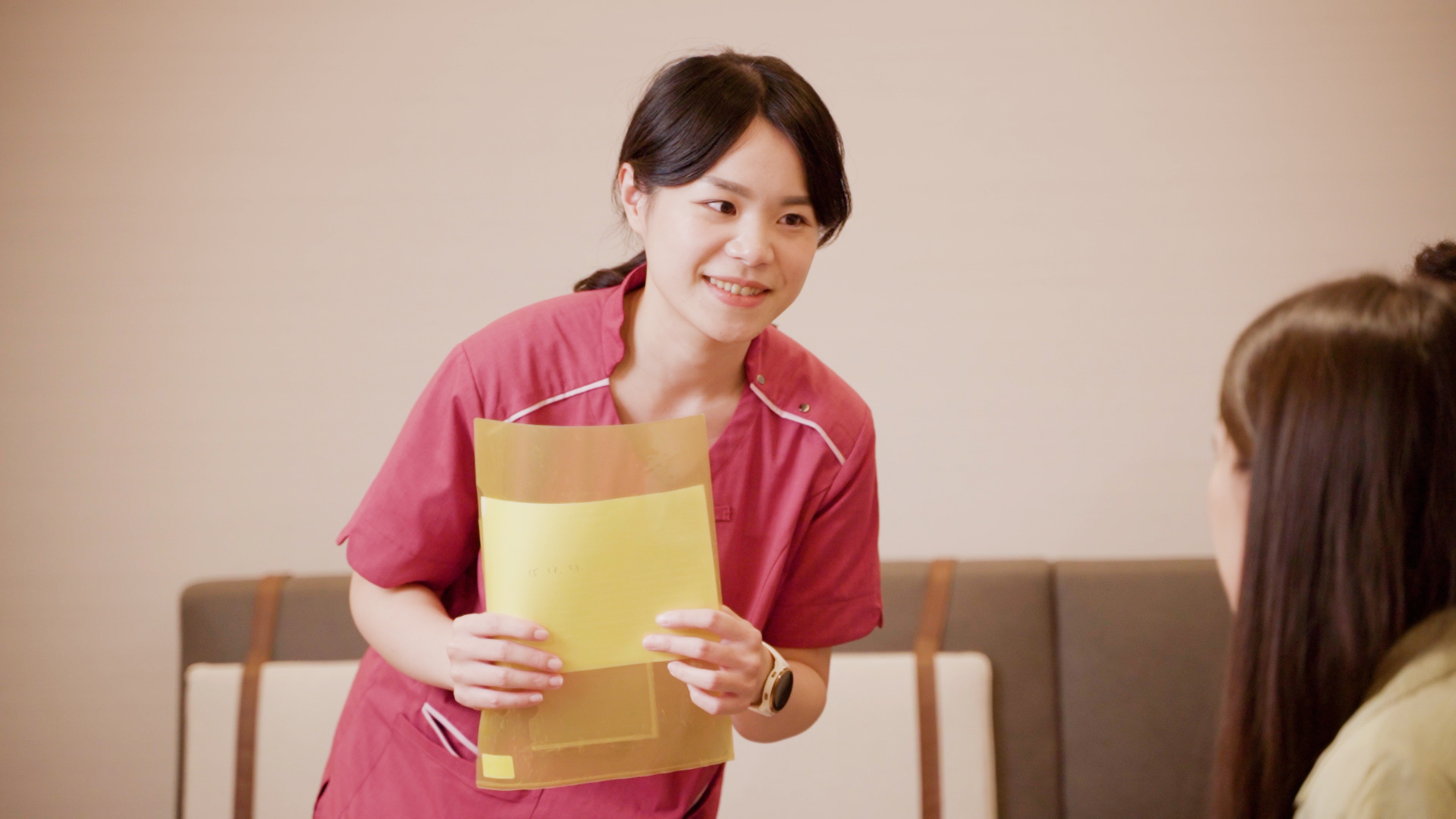
Taking A Look at the Old & New Expanded Subsidy
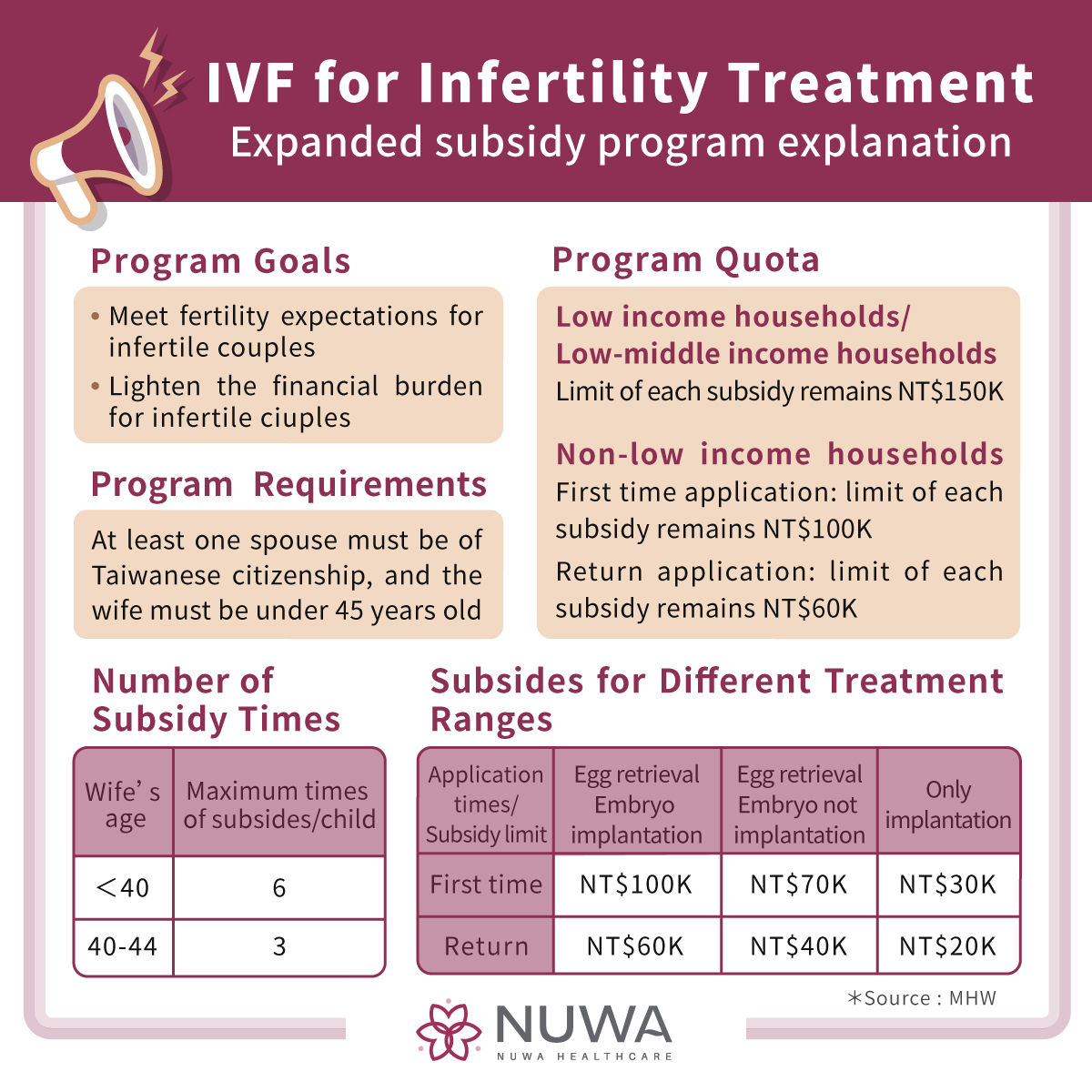 According to government regulations, Taiwan’s Ministry of Health and Welfare began its IVF Subsidy for Infertility Treatment on July 1st, 2021, and has since expanded the program for married couples. The subsidy amount and quota have been adjusted accordingly:
According to government regulations, Taiwan’s Ministry of Health and Welfare began its IVF Subsidy for Infertility Treatment on July 1st, 2021, and has since expanded the program for married couples. The subsidy amount and quota have been adjusted accordingly:Before Expanded Subsidy After Expanded Subsidy Prospects Low and low-middle income households with infertility In All households with infertility, the wife would be less than 45 years of age Subsidy Amount Maximum NT$150K per year Low and low-middle-income households’ maximum subsidy each time is NT$150k. Regular households’ maximum subsidy for the first time is NT$100k, and the return application for subsidy is a maximum of NT$60k. Number of Subsidies Once per year Under 40 yrs old: 6 subsidies max each pregnancy
40-44 yrs old: 3 subsidies max each pregnancyNumber of Cooperating Reproductive Organizations 20 clinics 100 clinics
(Data according to the HPA since March 5th, 2024)How to Apply Apply with self-provided infertility diagnosis documents Applied online by reproductive institution For those who have already given birth via IVF, the number of subsidies for another child will be re-calculated according to the current age range of the woman. For example, if Ms. A applies for the subsidy when she is 39 years old, she can apply up to 6 times. If after a year she’s now 40 years old and wants to have a second child, the number of times she can apply is recalculated but will change to a maximum of 3 times.Prospective Patients & Qualifications
IVF Subsidy Qualifications- One of the spouses must be of Taiwanese citizenship
- The wife must be under 45 years old
- Married couples who have been diagnosed with infertility at reproductive institutions, and would need to undergo IVF treatment.
Subsidy Amount CalculationThe maximum number of subsidies is 6 for women under 39 years of age, and the maximum number of subsidies is 3 for women between 40 and 44 years of age. Low-income and lower-middle-income households will receive a maximum subsidy of NT$150,000 per application. Generally infertile couples can receive a maximum subsidy of NT$100,000 for first-time applicants and NT$60,000 for second-time applicants. The subsidy amount will also vary depending on each couple’s treatment plan (if the treatment cost does not reach the subsidy limit, the actual expense will be subsidized.) The table below shows the subsidy amount for different categories:Subsidy Amount Calculation
The maximum number of subsidies is 6 for women under 39 years of age, and the maximum number of subsidies is 3 for women between 40 and 44 years of age. Low-income and lower-middle-income households will receive a maximum subsidy of NT$150,000 per application. Generally infertile couples can receive a maximum subsidy of NT$100,000 for first-time applicants and NT$60,000 for second-time applicants. The subsidy amount will also vary depending on each couple’s treatment plan (if the treatment cost does not reach the subsidy limit, the actual expense will be subsidized.) The table below shows the subsidy amount for different categories:Egg Retrieval without Implantation Only Embryo Implantation Egg Retrieval with Embryo Implantation First Application NT$70k NT$30 NT$100k Return Application NT$40k NT$20 NT$60k For those who have already given birth via IVF, the number of subsidies for another child will be re-calculated according to the current age range of the woman. For example, if Ms. A applies for the subsidy when she is 39 years old, she can apply up to 6 times. If after a year she’s now 40 years old and wants to have a second child, the number of times she can apply is recalculated but will change to a maximum of 3 times.4 Steps
How does the application for the program work? Below are 4 steps that will guide you to receiving the treatment and applying for the program.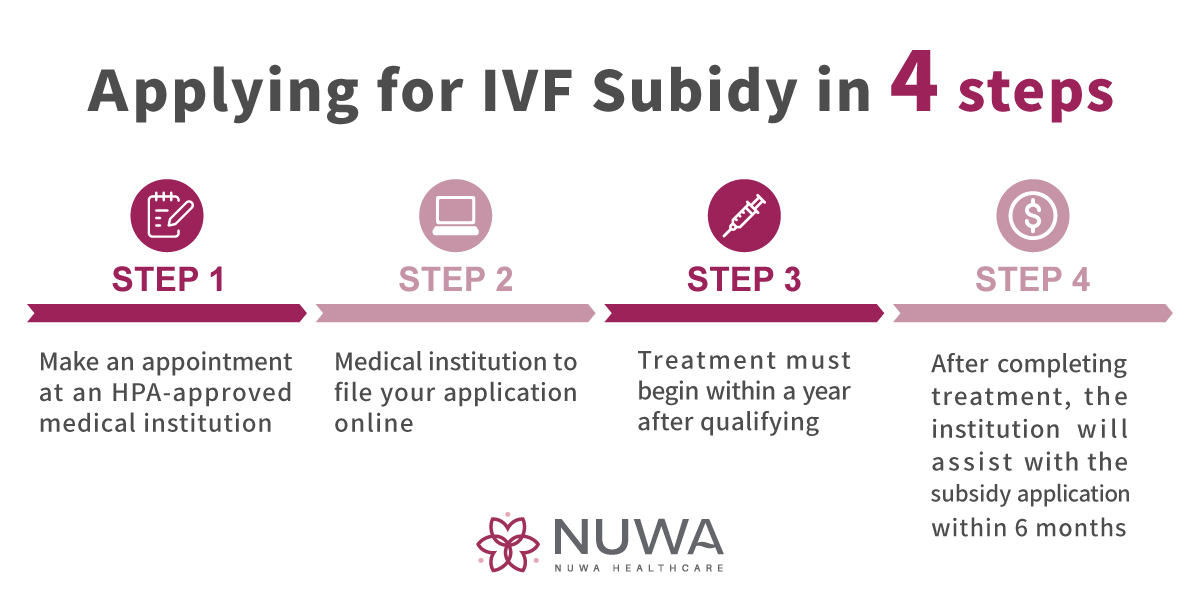 STEP 1. Make an appointment at an official reproductive institutionCouples who are diagnosed with infertility would need to consult with a specialist from a reproductive institution from Taiwan’s HPA.STEP 2. The institution will file your application onlineAfter verifying that the couple is eligible for the subsidy, the institution will apply for you online.STEP 3. Treatment must begin within a year of qualifyingOnce the subsidy amount and qualifications are confirmed, couples must begin treatment within a year.STEP 4. An appointed specialist from the institution will assist you in applying for the subsidyOnce the treatment is completed, institutions will apply online for the subsidy within 6 months. Once everything is verified, the subsidy amount will be directly wired to the recipient’s designated bank account.
STEP 1. Make an appointment at an official reproductive institutionCouples who are diagnosed with infertility would need to consult with a specialist from a reproductive institution from Taiwan’s HPA.STEP 2. The institution will file your application onlineAfter verifying that the couple is eligible for the subsidy, the institution will apply for you online.STEP 3. Treatment must begin within a year of qualifyingOnce the subsidy amount and qualifications are confirmed, couples must begin treatment within a year.STEP 4. An appointed specialist from the institution will assist you in applying for the subsidyOnce the treatment is completed, institutions will apply online for the subsidy within 6 months. Once everything is verified, the subsidy amount will be directly wired to the recipient’s designated bank account.Q&A
Q1: When will I receive the subsidy?Once the application is completed, you will be able to receive the subsidy amount after a month. If you want to understand the details, you can check your status by entering the wife’s ID and your designated serial number through “IVF Subsidy Program Status Update.”Q2: If I freeze my eggs before the program, and will need to thaw then inseminate the egg, how much will the subsidy amount be?As this treatment only involves “implantation,” the subsidy will only cover the embryo implantation. For first-time applicants, the subsidy amount will be NT$30k; for return applicants, the subsidy amount will be NT$20k.Q3: Is this subsidy program only applicable for the first pregnancy?There’s no restriction as to being only applicable for the first pregnancy! As long as you qualify for the subsidy, you can apply.Q4: What are some of the reproductive institutions the program works with?As listed on Taiwan’s HPA’s website, 100 reproductive clinics are cooperating as of March 5th, 2024.NUWA Fertility Center is a medical institution that focuses on women’s managed care. Offering a compassionate and empathetic all-female staff allows each woman to consult their doctors without inhibitions. NUWA provides a one-stop service to all, and with personal embryologists caring for every single embryo under the most advanced technology, our clinic aims to help every couple achieve their dreams of parenthood.If you’re interested or have any questions regarding IVF treatments or the subsidy program, please fill out this consultation form, and our team members will get back to you as soon as possible! You are also more than welcome to come in for a consultation👉 Book OnlineAuthor's InformationNUWA Fertility CenterWith many infertility experts and more than 10,000 doctors with successful IVF experience, the company has 5 clinics, including 3 high-specification IVF reproduction centers, 2 TCM centers, and 3 international embryo laboratories, which are located in Taipei, Taoyuan, and Taichung.Main Services: Infertility treatment, IVF, artificial insemination, egg freezing, egg borrowing, and pregnancy preparation. In 2021, NUWA Healthcare formally cooperated with Dianthus Medical Group to provide one-stop integrated services for preparation, pregnancy, labor, and postpartum care, which will bring the greatest convenience to the patients. 👉 Learn more about NUWA Healthcare2025.02.20
- One of the spouses must be of Taiwanese citizenship
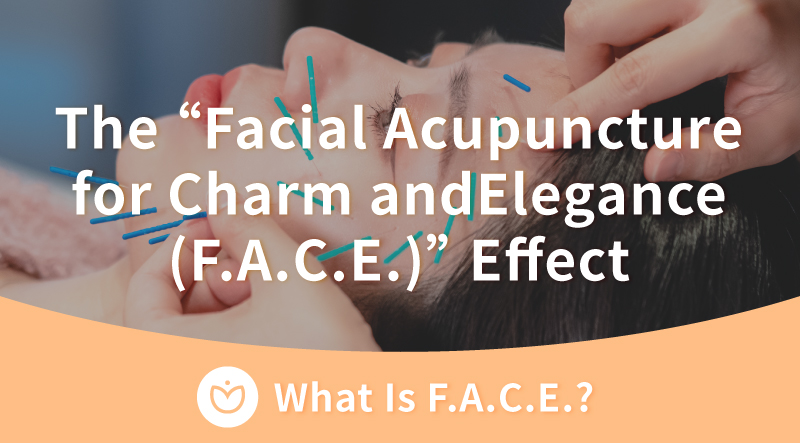
TCM Resources
The “Facial Acupuncture for Charm and Elegance (F.A.C.E.)” Effect
What are the results for F.A.C.E.? Will the treatment hurt? Who’s suitable for it? Societal beauty standards have been changing, whether through skincare or aesthetic medicine. Aside from them, do you know what F.A.C.E. is? Let’s dive in and read through what its principle is, its precautions, and everything in between!
What is F.A.C.E.?
Facial Acupuncture for Charm and Elegance, or F.A.C.E. in short, originated in Korea, one of the most popular places for aesthetic medicine. The founder of F.A.C.E. is the Korean professor Dr. Song Jhen Han, who used TCM to provide a non-invasive way to remodel facial features and shape without using injections or medications. The technique is deeply rooted in using hair-like needles to target fascia, muscles, and ligaments to improve circulation and lift facial lines through acupuncture. Aside from aesthetic purposes, F.A.C.E. is also used to alleviate pain and improve insomnia. It is an elegant and special technology that is loved by Japanese celebrities and Youtubers!Principles & Result Analysis
TCM acupuncture’s main principle is to use acupuncture needles to improve and circulate the blood and qi within the body. It can be used to cure diseases or alleviate symptoms. F.A.C.E. integrates both Chinese medicine and Western technology to create a treatment that focuses on the head and face. Through F.A.C.E., these can be achieved:- Muscle relaxation
- Restore muscle elasticity
- Lift facial lines
- Reduce fine lines
- Lift facial shape
It is recommended to those, especially with uncoordinated facial expressions; that F.A.C.E. will be able to balance the tension of the right and left facial muscles.Who is Suitable for F.A.C.E.?
F.A.C.E. is suitable for all skin types, whether it’s oily, dry, or combination skin. It is also suitable for men and women of all ages, but those with skin lesions or conditions must inform their doctor first to avoid any complications. Let’s talk about who is and isn’t suitable for F.A.C.E. in detail below: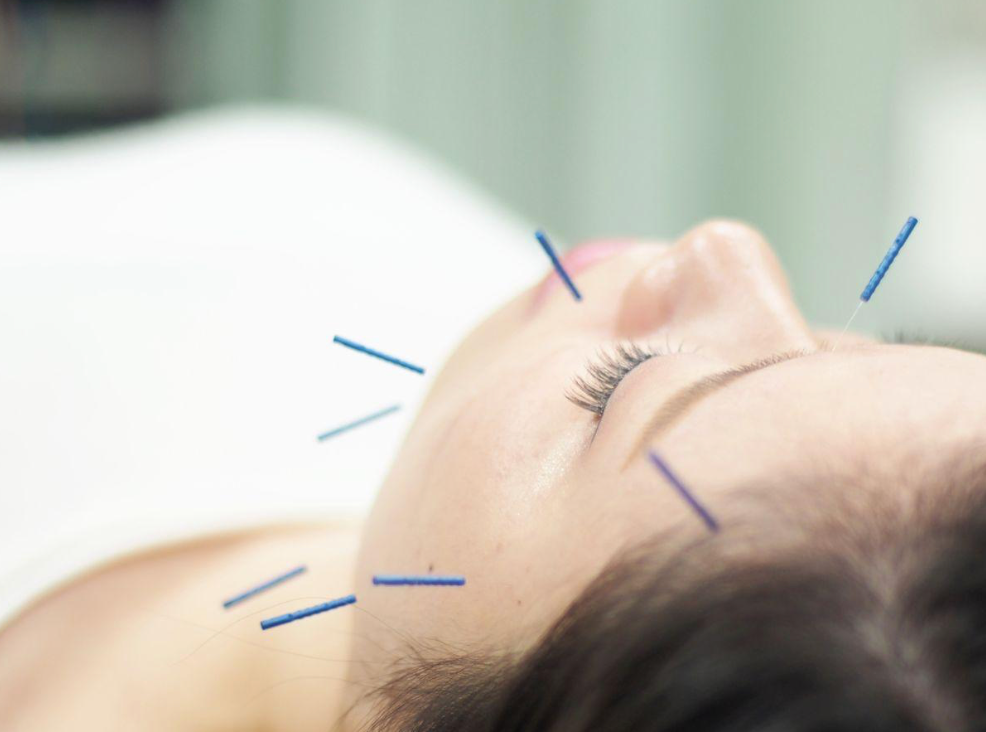 TCM F.A.C.E. is suitable for those who have:✅ Sagging jowls✅ Asymmetrical face✅ Overactive masseter muscles✅ Tight scalp✅ Stress and migraines✅ Poor sleep quality✅ Reduce fine lines: nasolabial folds, crow’s feet, etc.
TCM F.A.C.E. is suitable for those who have:✅ Sagging jowls✅ Asymmetrical face✅ Overactive masseter muscles✅ Tight scalp✅ Stress and migraines✅ Poor sleep quality✅ Reduce fine lines: nasolabial folds, crow’s feet, etc.Not Suitable For 4 Groups:
⚠️ Women whose menstrual cycle starts 1-3 days beforeWomen's qi and circulation are usually weaker right before menstruation. Since everyone is different, it is still recommended to consult your physician before treatment.⚠️ Those who’ve done facial threading, laser treatments, etc.It is best to avoid F.A.C.E. treatments for those who’ve done aesthetic medical treatments recently, especially fillers or invasive facial treatments. On the other hand, F.A.C.E. is fine after treatments like Pico laser or spot removals, but it is still recommended that any treatments are disclosed to the doctor before getting the desired result. On top of that, some people would go above and beyond, and get Thermage FLX once a year and F.A.C.E. every month as maintenance and self-care.⚠️ Those with recent public appearancesF.A.C.E. can very rarely cause bruising sometimes. Those who need to show their face in public appearances, or have any important plans in 2 weeks, are recommended to avoid F.A.C.E. treatments to prevent swelling during public appearances.⚠️ Those with an open wound, inflammation, or swellingAside from having an open wound, inflammation, or swelling, those with conditions such as lymphedema, poor blood clotting, (ex: hemophilia, taking anticoagulant medications), serious illnesses, chronic diseases (ex: diabetes), and those who are faint around needles are not recommended for F.A.C.E.!Are There Side Effects?
 F.A.C.E. is a noninvasive procedure, and it uses extremely fine microneedles that latch onto the scalp and face. Every needle’s direction, depth, and angle is different for everyone, and it stimulates the deeper muscles and fascia of superficial skin and meridians. Even though the microneedles are tiny and the probability of bleeding and scarring is low, there are sometimes cases of bruising or swelling, so it is best to avoid rubbing or kneading the skin for 2 days.
F.A.C.E. is a noninvasive procedure, and it uses extremely fine microneedles that latch onto the scalp and face. Every needle’s direction, depth, and angle is different for everyone, and it stimulates the deeper muscles and fascia of superficial skin and meridians. Even though the microneedles are tiny and the probability of bleeding and scarring is low, there are sometimes cases of bruising or swelling, so it is best to avoid rubbing or kneading the skin for 2 days.Need-To-Know for the Best Result!
 After the F.A.C.E. procedure, it is normal to experience a slight hot and heated sensation for a couple of hours. After that, it is also normal to experience facial tightness and soreness while making expressions for a few days. Below are 3 stages of the treatment, and let’s dive into the do’s and don’ts of each step.Before:
After the F.A.C.E. procedure, it is normal to experience a slight hot and heated sensation for a couple of hours. After that, it is also normal to experience facial tightness and soreness while making expressions for a few days. Below are 3 stages of the treatment, and let’s dive into the do’s and don’ts of each step.Before:- Test well and get a good night's sleep the night before
- Please avoid makeup or put on light makeup the day of treatment, sunscreen or toner would suffice. You would need to thoroughly wash your face before treatment to prevent infection.
- Please inform your doctor if you have bloodborne infectious diseases (ex: Hepatitis B, C)
During:- Avoid making big facial expressions
- Please inform the doctor if you experience any dizziness, chest tightness, sweating, difficulty breathing, continuous pain, or any discomfort during the treatment
After:- Skin will appear radiant after treatment, but to prevent overexposure or sunburn, please apply moderate amounts of skincare and facemasks accordingly
- If there is bruising or swelling, please avoid rubbing for 2 days. You can use a hot compression 3 days after treatment and will disappear around 1-2 weeks
- If there’s slight bleeding after the treatment, please avoid contact with water for 2 hours
- If you experience swelling, pain, or discomfort, it is recommended to consult your physician
Extended Reading: TCM F.A.C.E. Procedure ExplainedFAQs
Q1: I’m scared of needles, does the treatment hurt?F.A.C.E. needles are slightly thinner than acupuncture needles, and even thinner than hair sometimes. It is best described as a mosquito bite most of the time, and most can barely feel the needles; it is usually widely accepted by everyone. There might be soreness and tightness if it is done on deeper fine lines on the face, but because it relaxes the head and scalp, a lot of patients will even fall asleep during treatment!Q2: Can I return to work right after the F.A.C.E. treatment?Of course! There is no recovery period for F.A.C.E., and you can put on makeup right after the treatment. It’s super convenient for office workers or new moms, providing a small window of relaxation for them!Q3: What’s the difference between F.A.C.E. and a regular aesthetic clinic? Which one yields a better result?Usually, aesthetic medicine treatments include: botox, facelifts, threading, fillers, etc., and are invasive most of the time. They all have higher levels of pain and costs despite seeing results immediately after. On the other hand, TCM F.A.C.E. uses a softer and more comfortable approach compared to that of aesthetic medicine. This is usually done routinely as maintenance and for longer-lasting results, and will be adjusted accordingly to your physical state by the doctor. It’s highly suitable for those who are scared of pain and desire natural beauty treatments that are lower in cost.TCM F.A.C.E. is a combination of aesthetic medicine technology and traditional Chinese medicine, a feature that is not seen in aesthetic medicine. Sometimes people use both kinds of treatments interchangeably to get their desired results!✨ To make an appointment for F.A.C.E.:Official LINE - NUWA TaipeiOfficial LINE - NUWA TaichungIf you want to know more about our clinics, please proceed to NUWA Healthcare’s website, where there is a detailed description of our clinics and services!Author’s InformationNUWA TCMNUWA’s TCM team boasts over 20 years of experience, with clinics in Taipei and Taichung. We offer an individual acupuncture room, prioritizing your privacy and comfort above all else. We hope we can provide even more comfort on this recuperating journey in our TCM clinic.Main Services: Infertility treatment, pregnancy preparation, pregnancy, postpartum care, miscarriages, menstrual pain, allergies, weight loss, F.A.C.E., sleep disorders, child growth and development, etc. 👉 Learn more about NUWA Healthcare2024.08.14
- Muscle relaxation
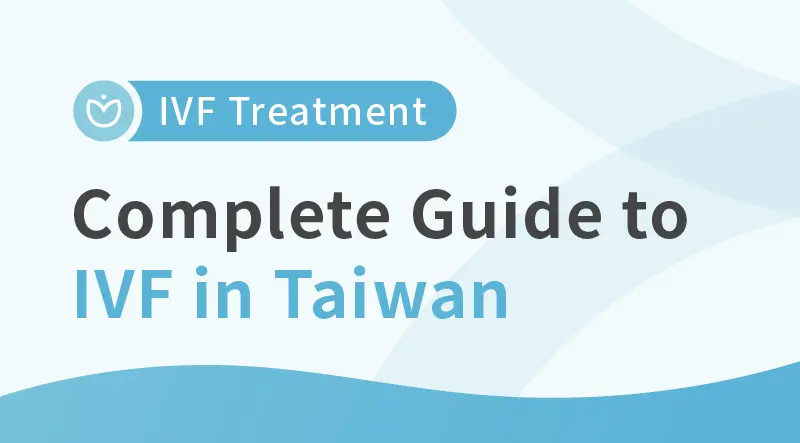
Fertility Resources
IVF in Taiwan: Process, Success Rate & Cost | NUWA Fertility Center
At NUWA Fertility Center, we support patients every step of the way through their IVF journey in Taiwan. Whether you're just starting to explore fertility options or have undergone treatments before, understanding the IVF process, success rates, and costs can help you make confident decisions. Here's what you need to know.What is IVF? IVF v.s. IUI
In vitro fertilization (IVF) is a process where eggs and sperm are retrieved and fertilized outside the body in a laboratory. The resulting embryo is then cultured for 3 to 5 days before being transferred back into the woman’s uterus. This method is especially helpful for couples facing complex fertility issues.In contrast, intrauterine insemination (IUI) - also referred to as artificial insemination -involves washing and preparing the partner’s sperm to isolate high-quality, motile sperm. The sperm is then directly inserted into the uterus during ovulation, aiming for natural fertilization within the body.The difference between In Vitro Fertilization, or IVF, and Artificial Insemination, or IUI, lies in the way they are performed.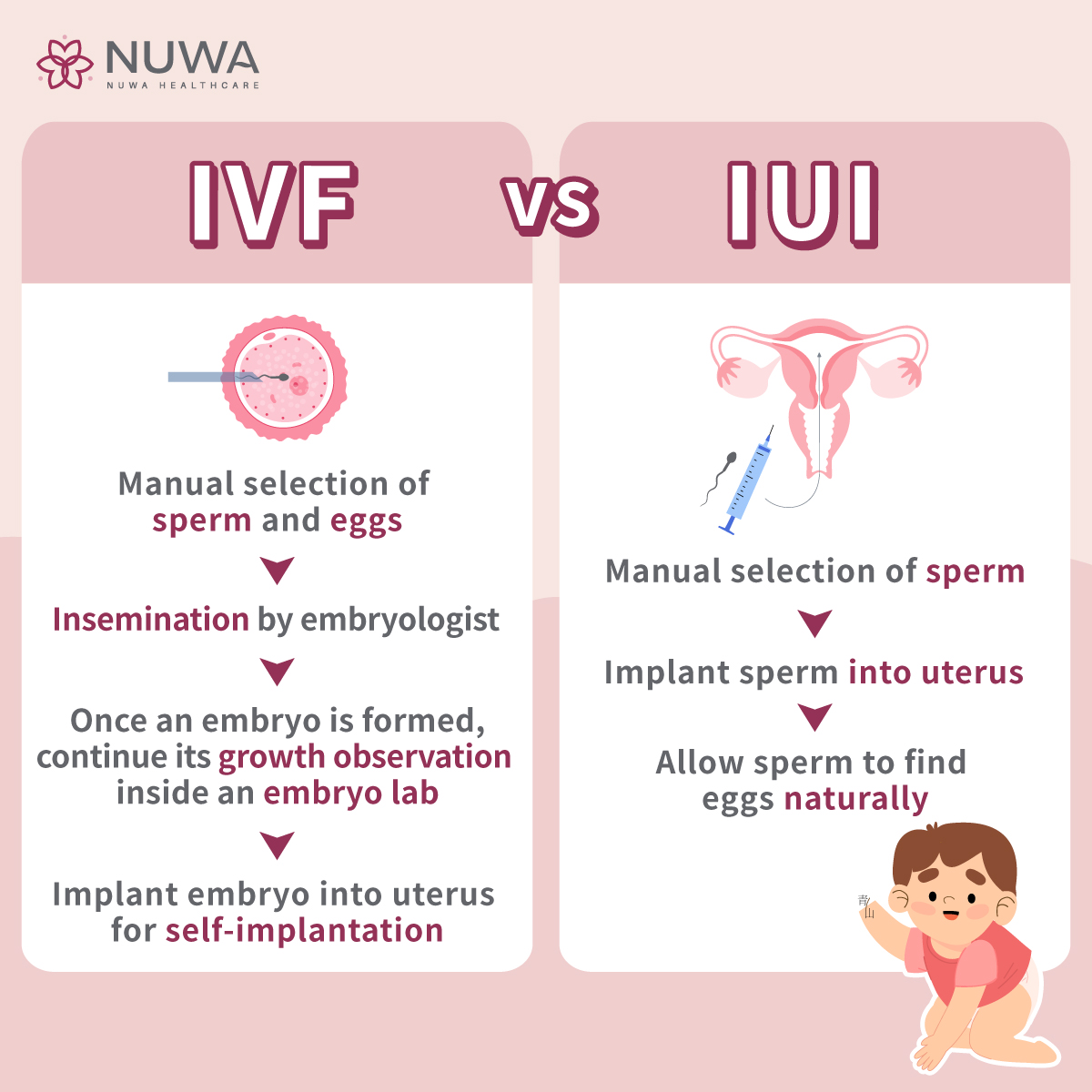
IVF vs. IUI Comparison Table
Feature
IVF (In Vitro Fertilization) IUI (Intrauterine Insemination)
Fertilization Process Eggs and sperm are fertilized outside the body in a lab under the supervision of embryologists
Sperm is injected directly into the uterus to fertilize the egg naturally
Embryo Development
Embryos are cultured for 3–5 days before transfer
No embryo culture; fertilization occurs inside the body Government Subsidy
Eligible for government subsidies in Taiwan (learn more in the next section) Not eligible for subsidies Success Rate Higher pregnancy success rate compared to IUI Generally lower success rate than IVF Average Cost in Taiwan Higher, but significantly supported by government IVF subsidies Lower, but no financial aid Currently, the government only subsidizes the cost of IVF, not IUI, so the difference in cost between the two is almost the same, but the average pregnancy rate between the two treatments is several times higher!Who is Suitable for IVF Treatment?
Who is suitable for IVF treatment? If you meet the following criteria, it is recommended that you seek professional advice.- Poor sperm quality
- Obstruction or edema of the fallopian tubes
- Moderately severe endometriosis
- Women over 38 years old
- Premature ovarian failure or extremely low AMH values
- Recurrent IUI failure
- Unexplained infertility
If you are under 34 years old and have not been able to conceive for one year, or 35 to 38 years old and have not been able to conceive for six months, or over 38 years old and still trying to conceive, and if you fall into any of these three categories, NUWA Fertility Center may suggest seeking professional help as soon as possible.IVF Success Rate in Taiwan
The success rate of IVF is closely related to egg quality, uterine environment, embryo quality, etc., and varies according to each individual's physical condition. According to the Assisted Reproductive Technology Summary 2021 National Report of Taiwan, the pregnancy rate for implantation cycles was 44.3%; the pregnancy rate for treatment cycles was 22.5% (commonly referred to as the "pregnancy rate,") the cumulative live birth rate for treatment cycles was 27.9%, and the cumulative live birth rate for treatment cycles before the age of 38 years was 43.5%. The results of the survey showed that both pregnancy and live birth rates decreased with the age of the treated women.NUWA Healthcare has a large number of expert Traditional Chinese Medicine physicians and reproductive medicine physicians, professional embryologists, and high-quality equipment, which boasts the team’s ability to pay attention to small details. These are key factors for NUWA Healthcare’s high fertility rates and success.IVF Cost in Taiwan
Wondering about the IVF cost in Taiwan? Compared to other countries, Taiwan offers high-quality fertility treatment at a more affordable price. On average, IVF treatment costs start at NT$150,000 to NT$180,000, with additional costs for medication.The main cost items of IVF treatment include:- Egg Retrieval
- Fertilization
- ICSI if necessary (no additional charge)
- Embryo culture (including time-lapse photography)
- Freezing and thawing of embryos (including the first year of cryopreservation)
- Embryo implantation
Government Subsidies for IVF
To encourage childbirth, the Taiwanese government launched an expanded IVF subsidy program starting July 1, 2021. If either spouse is a Taiwanese national, the wife is under age 45, and a medical diagnosis of infertility is provided, the couple may be eligible for financial support.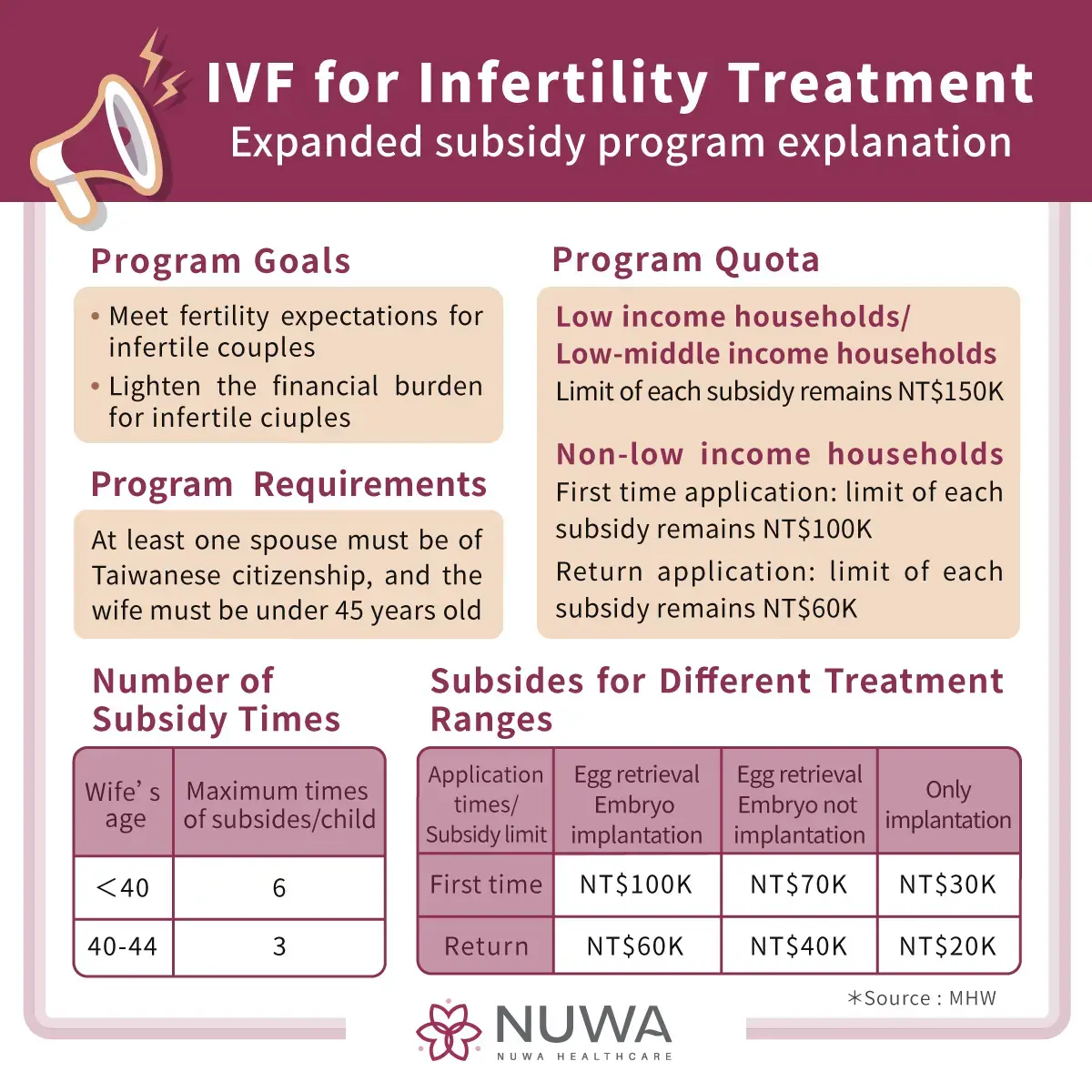
IVF Subsidy Amounts
General Applicants:- First IVF cycle: up to NT$100,000
- Second IVF cycle: up to NT$60,000
Low- and Lower-Middle-Income Households:- Up to NT$150,000 per cycle
Number of Subsidized Cycles
- Women under 39 years old (inclusive): up to 6 subsidized IVF cycles until a live birth
- Women aged 40–44: up to 3 subsidized IVF cycles
- After a successful IVF birth, the number of subsidies resets based on the woman’s age for future pregnancies
At NUWA Fertility Center, we are proud to be an approved artificial reproduction institution in Taiwan. Our team will guide you through the application process for IVF subsidies and help you make the most of available financial resources.👉 Extended reading: Learn more about the eligibility criteria, subsidy amounts, and the full process for the 2025 IVF subsidy program in Taiwan.The IVF Treatment Process at NUWA
Each IVF journey at NUWA Fertility Center is carefully guided by our medical professionals. Here's a general overview of the treatment steps:Step 1: Start Treatment
Book a consultation on the second to fourth day of the menstrual cycle and undergo relevant tests, such as blood tests and an ultrasound. According to the doctor's recommendation, ovulation medication will be used to stimulate the ovaries to produce more follicles.Step 2: Inducing Ovulation
According to your doctor's recommendation, you should continue to use ovulation medication for follicle development. You should also return to the clinic routinely to have your blood drawn and ultrasound exams done to track changes in blood hormone values and monitor follicle maturity to determine when the best time to retrieve your eggs is.Step 3: Egg and Sperm Retrieval
The doctor will determine the appropriate window of time for egg retrieval, and an injection will be given 34-36 hours before egg retrieval.Step 4: Sperm Collection
- Egg Retrieval
- Abstain from sexual intercourse for 2 to 4 days before sperm collection
- Surgery is short and non-invasive, so there is no need for hospitalization
Step 5: Embryo Implantation
According to your doctor's recommendation, you can choose to implant fresh embryos or frozen embryos. The date of implantation will be adjusted according to the number of days of the embryo, the lining of the embryo, and the physical condition of the individual. The actual course of treatment should be thoroughly discussed with the doctor.Step 6: Follow-up Pregnancy Test
The blood test for pregnancy is the chorionic gonadotropin β-hCG value. Generally, a follow-up visit will be arranged about 14 days after implantation, so you can follow the doctor's schedule to return for the blood test.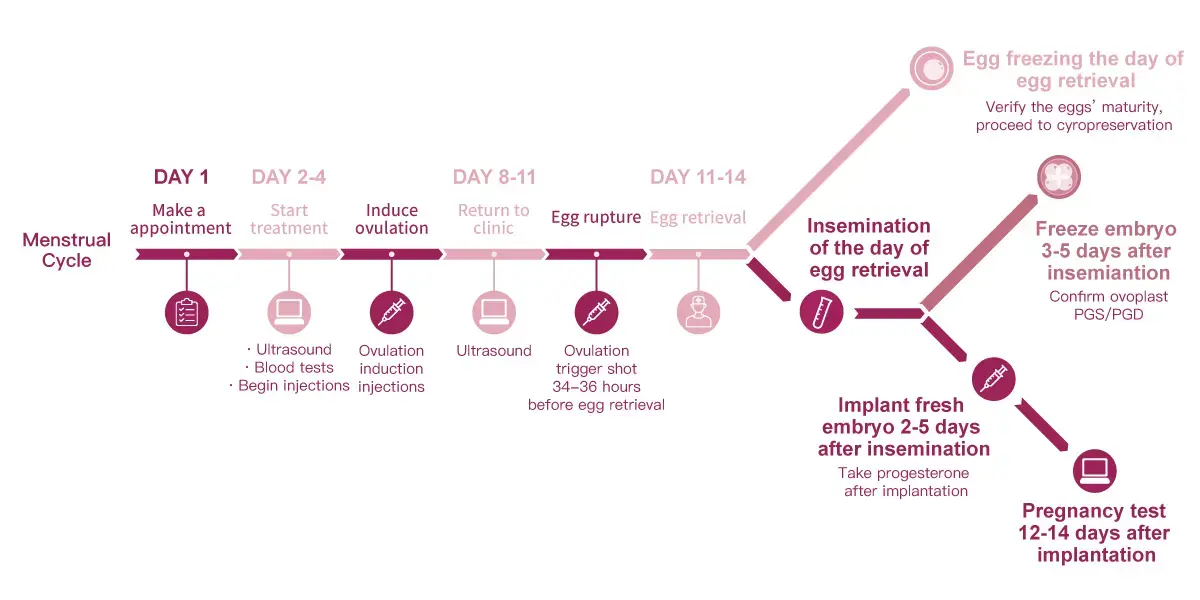
Are There Side Effects of IVF?
Are there any risks associated with IVF? Any side effects? Some women may experience discomfort from ovulation injection or overstimulation of the ovaries after egg retrieval. However, everyone reacts differently to hormone injections and may experience mild nausea, bloating, and edema. These side effects will subside within 1 to 2 weeks after stopping the medication.Ovarian Hyperstimulation Syndrome (OHSS) is a common complication that occurs after ovulation is induced. Depending on the severity, it can be mild, moderate, or severe, with symptoms such as abdominal bloating, abdominal pain, nausea, weight gain, and in severe cases, shortness of breath and even a decrease in urine output. Several things can be done to minimize the chances of OHSS, such as: lowering the dosage of gonadotropins or suspending their use for a few days to minimize the stimulation of the ovaries; freezing the embryos instead of implanting them fresh; and changing the egg-broken egg injections, etc. The doctor will observe and decide on the appropriate course of action, and it is recommended to respond immediately and seek professional help if any of these conditions arise to help reduce the risk of Ovarian Hyperstimulation Syndrome. The physician will observe and determine the appropriate course of action for any condition.FAQs
Q1: Can I choose the gender for IVF?
According to Article 16 (3) of The Artificial Reproduction Law of Taiwan, the sex of IVF embryos cannot be chosen unless the couple has genetic diseases, such as color blindness and hemophilia. The doctor will then use PGT-A genetic screening to discover the sex of the fetus, to reduce the chances of the fetus suffering from genetic diseases and additional risks.Q2: Is it better to have more embryos implanted during IVF treatments?
The Taiwan Society of Reproductive Medicine (TSRM) has published a "Guideline on the Number of Embryos to be Implanted." Generally speaking, the younger the mother, the higher the chance of success. Therefore, it is recommended that women younger than 35 years old have 1 or 2 embryos implanted; women between the ages of 35 and 37 are recommended to have 2 embryos implanted; women between the ages of 38 and 40 are recommended to have 3 embryos implanted; and women over the age of 41 can consider placing a "maximum" of 4 embryos.The number of embryos cannot avoid the problem of multiple births, which may cause premature labor and pregnancy complications. Therefore, the number of embryos to be implanted needs to take into account the age and physical condition of the mother, and it is recommended that you consult a professional doctor for a detailed discussion.Why Choose NUWA Fertility Center?
Do you have questions about IVF treatment but don't know where to go? If this has been on your mind, we recommend a visit to NUWA Fertility Center. Here are some of the things we do to help make prospective parents more comfortable to leave this important task to us!👍 Major Fertility Chain in TaiwanNUWA Healthcare has 3 high-quality IVF centers and 2 TCM centers in Taipei, Taoyuan, and Taichung, with a total of one hundred healthcare professionals providing comprehensive fertility treatments.👍 Expert Infertility TeamA crew of doctors with more than 10,000 successful in vitro fertilization procedures, including 15 reproductive medicine physicians, 5 Chinese medicine physicians, and 21 embryologists, stands as invaluable teammates for a successful pregnancy.👍 International-Grade Embryology LaboratoryWe have several advanced time-lapse Embryoscopes that use AI to accurately select embryos and create an environment suitable for embryo culture, and are committed to increasing pregnancy success rates!👍 Professional ServiceWe prioritize each person's experience in the clinic and provide expecting parents with a sincere and trusting consultation, as well as a comfortable and private clinic environment.👍 Traditional Chinese Medicine and Western Medicine IntegrationNUWA Healthcare includes the NUWA Fertility Center and the NUWA TCM Center, where traditional Chinese and Western physicians work together to help you achieve your fertility goals.If you have any questions about IVF, you are welcome to come to the clinic to consult with the doctors 👉 Make an appointment online👉 Extended reading: What is the definition of infertility? What are the basic tests?Contact Us for Your IVF Consultation
If you're considering IVF in Taiwan, NUWA Fertility Center is here to help. Contact us to schedule a consultation and take the first step toward building your family.Author's InformationNUWA Fertility CenterWith many infertility experts and more than 10,000 doctors with successful IVF experience, the company has 5 clinics, including 3 high-specification IVF reproduction centers, 2 TCM centers, and 3 international embryo laboratories, which are located in Taipei, Taoyuan, and Taichung.Main Services: Infertility treatment, IVF, artificial insemination, egg freezing, egg borrowing, and pregnancy preparation. In 2021, NUWA Healthcare will formally cooperate with Dianthus Medical Group to provide one-stop integrated services from preparation, pregnancy, labor, and postpartum care, which will bring the greatest convenience to the patients.👉Learn more about NUWA online2024.08.01
- Poor sperm quality

Fertility Resources
Egg Donation: Easier Than You Think!
Egg donation can provide a ray of hope for many couples trying to fulfill their dream of having a child. But what are the requirements for egg donation? What is the "Nutritional Benefit" they talk about? If you want to know more about egg donation, NUWA's here to explain so that you can understand the conditions, costs, procedures, and precautions of egg donation all at once!
What is Egg Donation? Why Do I Need an Egg Donor?
Some women may not be able to have children or get pregnant on their own after a long period due to age, illnesses, or unknown factors, and would therefore need a selfless act from a donor to realize their dreams of parenthood. Therefore, egg donation refers to the act of a woman, who needs help from a professional reproductive organization, to receive donor eggs from a donor. According to the Artificial Reproduction Law, donors can receive NT$99,000 in nutritional benefits.Egg Donation Conditions Explained
As long as a girl meets the following criteria, she can contact a qualified medical institution or fertility center for consultation. However, there are more requirements for the donor to be qualified to be able to donate by the regulations of each institution.- Must be at least 20 years old
- BMI between 18.5 and 24
- No smoking, drug abuse, or other bad habits
- No anemia, hereditary, or chronic diseases
- No long-term use of drugs
- Have never donated eggs, or the recipient couple has not had a live birth as a result of your donation and have no stored embryos awaiting implantation
7 Steps of the Egg Donation Process
 STEP 1. Donation RegistrationFill in the registration form for egg donation at a qualified medical institution. At NUWA, you can fill out an "Egg Donation Inquiry Form" online and someone will contact you by phone.STEP 2. Health AssessmentGo to the hospital for health checkups, including ovarian function AMH test, HIV, syphilis, Hepatitis B, Hepatitis C, chromosomes, etc., and wait for the report of the checkups, which will take about seven to fourteen days.STEP 3. Matching ProcessWait one to three months for the Health Promotion Administration to confirm your identity. Once your identity has been verified, you will need to start recording and reporting your menstrual cycle and await notification of your treatment.STEP 4. Start TreatmentA customized schedule of ovulation injections will be planned for you, with follow-up visits and ultrasound observations of the uterus.STEP 5. Egg Retrieval SurgeryOn the day of surgery, you will need to fast for eight hours and undergo superficial general anesthesia. The egg retrieval surgery will take about fifteen to twenty minutes, and after waking up and resting for one to two hours to make sure that you are physically okay, you can leave the institution.STEP 6. Receive Nutritional BenefitYou can receive NT$99,000 in Nutritional Benefits on the same day.STEP 7. Post-operative trackingFollow up 3 days after egg retrieval to check for ovarian hyperstimulation and inform the recipient of her condition.
STEP 1. Donation RegistrationFill in the registration form for egg donation at a qualified medical institution. At NUWA, you can fill out an "Egg Donation Inquiry Form" online and someone will contact you by phone.STEP 2. Health AssessmentGo to the hospital for health checkups, including ovarian function AMH test, HIV, syphilis, Hepatitis B, Hepatitis C, chromosomes, etc., and wait for the report of the checkups, which will take about seven to fourteen days.STEP 3. Matching ProcessWait one to three months for the Health Promotion Administration to confirm your identity. Once your identity has been verified, you will need to start recording and reporting your menstrual cycle and await notification of your treatment.STEP 4. Start TreatmentA customized schedule of ovulation injections will be planned for you, with follow-up visits and ultrasound observations of the uterus.STEP 5. Egg Retrieval SurgeryOn the day of surgery, you will need to fast for eight hours and undergo superficial general anesthesia. The egg retrieval surgery will take about fifteen to twenty minutes, and after waking up and resting for one to two hours to make sure that you are physically okay, you can leave the institution.STEP 6. Receive Nutritional BenefitYou can receive NT$99,000 in Nutritional Benefits on the same day.STEP 7. Post-operative trackingFollow up 3 days after egg retrieval to check for ovarian hyperstimulation and inform the recipient of her condition.Understanding Risks & Precautions
Egg donation is a safe medical practice, but there are some risks. The injection of ovulation drugs may cause localized discomfort or allergies. If you choose a fertility agency that has not been inspected by the Health Promotion Administration and the Ministry of Health and Welfare for egg donation, it may lead to OHSS (Ovarian Hyperstimulation Syndrome) after the egg donation surgery. In addition, the following precautions should be taken before, during, and after egg donation:1. Fully inform the physician of your physical conditionIf you are taking Chinese medicine, Western medicine, or contraceptives, you should inform your doctor before entering the treatment program.2. Regular visits to the doctor and follow the doctor's instructionsYou have to cooperate with the doctor's instructions, return to the clinic at the appointed time, and take the medication and injections on time. You should not interrupt the medication on your own to avoid affecting the course of treatment and having to bear the cost of the loss.3. Fasting and water fasting before surgeryEgg donation surgery requires 8 hours of fasting and water fasting before the surgery. Since general anesthesia is used, it is recommended to have someone accompanying you on the day of the surgery to ensure your safety on the way home.4. Makeup-free on the day of surgeryOn the day of the egg donation surgery, you will need to be makeup-free and those who are nearsighted will need to wear eyeglasses, and any manicures and pedicures will also need to be removed.5. Sufficient rest after surgeryUntil your next menstrual period, it is important to stay hydrated and avoid strenuous exercise and sexual intercourse for your body to get enough rest.NUWA Fertility Center’s egg donor is equipped with a top medical team and medical equipment, which can minimize risks significantly, so the girls can rest assured.What Are Nutritional Benefits?
Egg donation is a legal donation. According to the Artificial Reproduction Law, as long as the egg donation is performed at a medical institution that has been evaluated and qualified by the Health Promotion Administration, the Ministry of Health and Welfare, and at the same time meets the conditions of egg donation, health examination, evaluation as regulated by the law, and completes the egg donation, the egg donor will be able to receive NT$99,000 in nutritional benefits on the day of the egg donation treatment.In addition, from the pre-treatment physical assessment to the subsequent egg retrieval surgery, the entire process is complimentary, including the registration and consultation fees.FAQs
Q1: Is there a limit to the number of times I can donate eggs?According to Taiwan regulations, a woman can only have one egg donation opportunity in Taiwan. When the recipient mom gives birth to a baby, the girl cannot donate again, and can only donate again if the recipient mom fails to give birth to a live baby.Q2: Will egg donation lead to early menopause?Egg donation will not cause early menopause. Normal women produce a certain number of eggs every month, but only 1 to 2 eggs are mature, while the rest will naturally shrink and be consumed. Egg donation is a method of using injections and medications to mature eggs that would otherwise be eliminated and consumed, and therefore will not cause early menopause.Q3: Do donor eggs cause period disruption?Since ovulation injections are hormonal drugs, some women may experience "early or late" menstrual cycles after egg retrieval, but these are temporary phenomena and will usually return to normal after 1 or 2 cycles.Q4: Does egg donation cause weight gain?Some women may experience a weight gain of 3 to 5 kilograms as a result of their diet and work routine. However, this is due to the effect of the hormonal medication in the ovulation injection, resulting in temporary edema, which will be restored after the treatment is completed and the medication has been metabolized.Q5: Would I accidentally donate eggs to a relative?Don't worry! There will be no cases of donation to relatives. Before the egg retrieval surgery, the information of the donor and the recipient couple will be sent to the Health Promotion Administration, and the Ministry of Health and Welfare to confirm that they are not related within the fourth degree of consanguinity before the beginning of the treatment.NUWA Fertility Center: Professional and Safe for Egg Donation
 If you would like to donate your love and eggs, you can go to NUWA Fertility Center. We have the following 4 features that make egg donation a safe choice for women.
If you would like to donate your love and eggs, you can go to NUWA Fertility Center. We have the following 4 features that make egg donation a safe choice for women.- Provide specialized ovulation injection services to help donors reduce the psychological barrier of the injection.
- You can choose to be taken care of by a team of female fertility specialists throughout the entire process so that the donor can have a good egg donation experience.
- As an artificial reproduction organization approved by the Health Promotion Administration and the Ministry of Health and Welfare, the process of egg donation follows the Artificial Reproduction Act.
- We have a professional medical team and advanced equipment to ensure that the risk of egg donation is minimized for each donor.
NUWA Fertility Center has clinics in Taipei, Taoyuan, and Taichung, so donors can choose the clinic nearest to them. If you have any other questions about egg donation, please feel free to visit our clinic directly. 👉 Make an appointment online.Author's InformationNUWA Fertility CenterWith many infertility experts and more than 10,000 doctors with successful IVF experience, the company has 5 clinics, including 3 high-specification IVF reproduction centers, 2 TCM centers, and 3 international embryo laboratories, which are located in Taipei, Taoyuan, and Taichung.Main Services: Infertility treatment, IVF, artificial insemination, egg freezing, egg borrowing, and pregnancy preparation. In 2021, NUWA Healthcare will formally cooperate with Dianthus Medical Group to provide one-stop integrated services for preparation, pregnancy, labor, and postpartum care, which will bring the greatest convenience to the patients. 👉Learn more about NUWA Healthcare2024.08.01
- Must be at least 20 years old

Fertility Resources
Egg Freezing in Taiwan for Foreigners | NUWA Fertility Center
Considering egg freezing abroad? Taiwan has become a top destination for women from Singapore, Malaysia, the Philippines, Thailand, and other Southeast Asian countries seeking safe, affordable, and advanced fertility preservation. NUWA Fertility Center offers comprehensive, foreigner-friendly egg freezing services with world-class care.





Why Freeze Your Eggs?
Egg freezing (oocyte cryopreservation) empowers women to take control of their reproductive future. Whether you're not ready to start a family or facing medical challenges, fertility preservation allows you to safeguard your chances of having biological children later.
🔹 Ideal Age for Egg Freezing:
Women between 30 and 35 years old benefit the most, as egg quality and quantity are optimal. After 35, both decline—more rapidly after 38.
Generally speaking, if a woman is in good physical condition and has sexual intercourse during her ovulation period, there is a 50% chance of getting pregnant between the ages of 20 and 25, a 40% chance between the ages of 26 and 35, and a 30% chance between the ages of 36 and 40.
🔹 Recommended for Women Who:
- Cancer patients with future fertility plans
- Over 30 years of age, who will not rule out having children in the future
- Premature ovarian failure or aging, need to collect a sufficient number of eggs for IVF treatment
- Endometriosis patients
- People with a family history of genetic diseases

Egg Freezing Procedure at NUWA
The egg freezing process at NUWA typically takes 10–14 days and involves five steps:

STEP 1: Make an appointment
Make an appointment to see your doctor and inform them about your condition so the doctor can evaluate your condition and assist you in scheduling your treatment.
STEP 2:Return to the clinic during the menstrual cycle
Return to the clinic on the 2nd to 3rd day of the menstrual cycle. Blood tests and an ultrasound will be performed before the egg-freezing treatment begins.
STEP 3:Ovulation induction
After beginning treatment, according to the doctor's diagnosis, ovulation injections or ovulation medication will be administered to induce ovulation, and about 2 visits will be scheduled for ultrasound examinations.
STEP 4:Egg retrieval procedure
Egg retrieval surgery is scheduled around the 11th to 14th day, and an ovulation trigger shot will be given before the procedure (34 to 36 hours before the procedure).
STEP 5:Egg freezing
Finally, the eggs will be frozen according to their maturity level. If you freeze your eggs at NUWA Fertility Center, you will be able to find out the number of eggs you have frozen on your NUWA Fertility Center APP.
Track your egg count and progress easily via the NUWA Fertility Center mobile app.
Egg Freezing Cost in Taiwan
At NUWA, the cost of egg freezing ranges from NT$90,000 to NT$120,000, which includes medication and one year of storage. Costs vary depending on ovarian function, medication, and your personalized treatment plan.
💡 Compared to egg freezing prices in Singapore, Malaysia, or Thailand, Taiwan offers excellent value with international-quality standards.
FAQs
Q1: How many eggs do you need to freeze to ensure it’s enough?
The quality of eggs decreases with age, and the older you get, the more eggs you would need to freeze if you're planning on expanding your family. According to the experience of our doctors at NUWA Fertility Center, the success rate of pregnancy is 70%:
- At 35 years old, you need about 8 eggs.
- At 38 years old, you need about 20 eggs.
- At 40 years old, you need about 35 eggs.
However, we are reminded that the above figures are based on planning for the birth of one child in the future. If you want to have a second or third child, you will need to freeze more eggs.
Q2: Will freezing my eggs speed up menopause?
No. Egg freezing doesn’t deplete your natural egg reserve. It simply matures eggs that would have naturally disintegrated in that cycle.
Egg freezing treatment is to induce ovulation through drug stimulation, so that other follicles that would have naturally shrunk during the cycles will have a chance to grow and, therefore, will not cause menopause to come early!
Q3: Where are my eggs stored?
All eggs are preserved in -196°C liquid nitrogen tanks under 24/7 surveillance with NUWA’s centralized monitoring system, ensuring the highest safety standards.
Q4: Are There Consequences that Comes With Egg Freezing?
While mild bloating or nausea may occur, serious complications are rare (<5%). NUWA doctors closely monitor your health throughout the cycle.
Q5: Are there government subsidies?
Yes! As of 2025, egg freezing subsidies are available in New Taipei City, Taipei City, Taoyuan, Hsinchu, Taichung, and Hualien for eligible residents. These local government programs aim to support women who wish to preserve their fertility through oocyte cryopreservation (egg freezing).
Each city may have slightly different eligibility requirements, subsidy amounts, and application procedures, so we recommend checking with the local Public Health Bureau or contacting NUWA Fertility Center for the most up-to-date details.
“2025 Taiwan Egg Freezing Subsidy Program: Eligibility, Application Steps, and Costs”
Why Choose NUWA Fertility Center?
🌟 8 Key Advantages:
- Taiwan’s Leading Fertility Chain – Clinics in Taipei, Taoyuan, and Taichung.
- International-Standard IVF Labs – Embryologists with 24/7 monitoring systems.
- 96.3% Egg Survival Rate – High post-thaw viability thanks to expert vitrification techniques.
- Privacy & Comfort – Boutique-style clinics designed for relaxation and discretion.
- In-House Injection Support – Personalized guidance for ovulation medication.
- Fast Results – AMH blood test results available in 90 minutes.
- Custom Treatment Plans – Flexible, including long-acting hormone injections.
- Traditional Chinese Medicine Integration – TCM doctors assist with womb and egg health.Traditional Chinese Medicine Integration – TCM doctors assist with womb and egg health.

Egg Freezing in Taiwan: The Smart Choice for Southeast Asian Women
Women and couples from Singapore, Malaysia, the Philippines, and Thailand are choosing Taiwan for egg freezing due to:
- Lower cost compared to that of their home countries’
- Advanced medical facilities with English-speaking staff
- Seamless coordination between Western and Chinese medicine
- Short travel time and friendly visa policies
Ready to Freeze Your Eggs in Taiwan?
Whether you're still exploring your options or ready to start, NUWA Fertility Center provides professional care, clear communication, and unwavering support.
👉 Book a Consultation Online
👉 Chat with our International Patient Coordinator
👉 Learn More about NUWA’s Fertility Services
Preserve your fertility before it's too late. NUWA Fertility Center is here to help you plan for the family you may want tomorrow—starting today.
Author's Information
NUWA Fertility Center
With many infertility experts and more than 10,000 doctors with successful IVF experience, the company has 5 clinics, including 3 high-specification IVF reproduction centers, 2 TCM centers, and 3 international embryo laboratories, which are located in Taipei, Taoyuan, and Taichung.
Main Services: Infertility treatment, IVF, artificial insemination, egg freezing, egg borrowing, and pregnancy preparation. In 2021, NUWA Healthcare will formally cooperate with Dianthus Medical Group to provide one-stop integrated services from preparation, pregnancy, labor, and postpartum care, which will bring the greatest convenience to the patients.👉Learn more about NUWA Healthcare
2025.04.28
One-On-One Service
Personalized service

How to Apply for A Medical Visa
Entry Permit Application

Seminars




